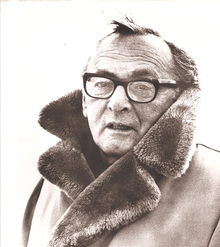A Quote by Sydney J. Harris
Knowledge fills a large brain; it merely inflates a small one.
Related Quotes
Now the Apostle, under the inspiration of the Holy Spirit, says, "Knowledge inflates: but love edifies." The only correct inerpretation of this saying is that knowledge is valuable when charity informs it. Without charity, knowledge inflates; that is, it exalts man to an arrogance which is nothing but a kind of windy emptiness.
The brain "fills in" the missing information from the blind spot. Notice what you see in the location of the dot when it's in your blind spot. When the dot disappears, you do not perceive a hole of whiteness or blackness in its place; instead your brain invents a patch of the background pattern. Your brain, with no information from that particular spot in visual space, fills in with the patterns around it. You're not perceiving what's out there. You're perceiving whatever your brain tells you.
It is certain that there may be extraordinary mental activity with an extremely small absolute mass of nervous matter: thus the wonderfully diversified instincts, mental powers, and affections of ants are notorious, yet their cerebral ganglia are not so large as the quarter of a small pin's head. Under this point of view, the brain of an ant is one of the most marvelous atoms of matter in the world, perhaps more so than the brain of a man.
From building a fire one can learn something about artistic composition. If you use only small kindling and large logs, the fire will quickly eat up the small pieces but will not become strong enough to attack the large ones. You must supply a scale of sizes from the smallest to the largest. The human eye also will not make its way into a painting or building unless a continuum of shapes leads from the small to the large, from the large to the small.
I'll tell you this: you cannot escape the impact of emotion, whether it's in a big theater or a tiny one. If you have it, it inflates you — correction, 'inflates' is not a good word. If you have it, it infects you and the audience. If you don't have it — don't bother; just say the lines as truthfully as you are capable of doing. You can't fake emotion. It immediately exposes the fact that you ain't got it.
The very large units of production and exchange have access to credit on a large scale, sometimes without any cover at all, merely upon the prospect of their success, and always upon terms far easier than are open to their smaller rivals. It is perhaps on this line of easier credit that large capital today does most harm to small capital, drives it out and ruins it.
Clothing sizes are weird, they go: small, medium, large and then extra large, extra extra large, extra extra extra large. Something happened at large, they just gave up. They were like, 'I'm not doing any more adjectives; you just keep putting extras on there.' We could do better than that: small, medium, large, whoa, easy, slow down, stop it, interesting, American.
Do not be afraid of large patterns, if properly designed they are more restful to the eye than small ones: on the whole, a pattern where the structure is large and the details much broken up is the most useful...very small rooms, as well as very large ones, look better ornamented with large patterns.
To begin with, our knowledge grows in spots. The spots may be large or small, but the knowledge ever grows all over... What you first gain from them is probably a small amount of new information, a few new definitions, or distinctions, or points of view. But while these special ideas are being added, the rest of your knowledge stands still, and only gradually will you 'line up' your previous opinions with the novelties I am trying to instil, and modify to some slight degree their mass.
Most students of nature sooner or later pass through a process of writing off a large percentage of their supposed capital of knowledge as a merely illusory asset. As we trace more accurately certain familiar sequences of phenomena we begin to realize how closely these sequences, or laws , as we call them, are hemmed round by still other laws of which we can form no notion. With myself this writing off of illusory assets has gone rather far and the cobweb of supposed knowledge has been pinched (as some one has phrased) into a particularly small pill.
We need only view a Dissection of that large Mass, the Brain, to have ground to bewail our Ignorance...We admire...the Fibres of every Muscle, and ought still more to admire their disposition in the Brain, where an infinite number of them contained in a very small Space, do each execute their particular Offices without confusion or disorder.
The entire object of true education is to make people not merely do the right things, but enjoy the right things — not merely industrious, but to love industry — not merely learned, but to love knowledge — not merely pure, but to love purity — not merely just, but to hunger and thirst after justice.

































